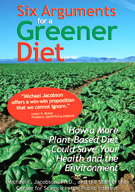Thursday, October 12, 2006
 |
Six Arguments for a Greener DietAuthor: By Michael F. Jacobson, Ph.D.
|
About This Book
Six Arguments for a Greener Diet is a meticulously researched examination of scientific studies that eating more plant foods and fewer fatty animal products can lead to extra years of healthy living. Its author, Center for Science in the Public Interest executive director Michael F. Jacobson, who wrote the book with the assistance of the CSPI staff, concludes that a greener diet also leads to much less food poisoning, water pollution, air pollution, global warming, and animal suffering.
Americans consume over 1 billion pounds and one trillion calories of food each day. To produce the grains, meat and poultry, and fruits and vegetables that feed a country of nearly 300 million people, our agricultural system consumes enormous quantities of fuel, fertilizers, water, pesticides, and enormous tracts of land—not just for growing food for people, but mostly for producing food for livestock. And ultimately, a diet rich in fatty animal products and poor in whole grains, fruits, and vegetables consumes the consumer: Higher rates of heart disease, stroke, certain cancers, diabetes, and obesity cause hundreds of thousands premature deaths each year.
Six Arguments for a Greener Diet exposes those and other underreported facts and carefully connects the dots between a healthy diet and a healthy planet.
With the book, CSPI has launched a new educational campaign called Eating Green to help people adopt a diet much richer in plant-based foods such as fruits, vegetables, and whole grains. The group offers these statistics:
- 16 percent: the decreased mortality from heart disease associated with eating one additional serving of fruit or vegetables each day;
- 24 percent: how much lower the rate of fatal heart attacks is in lacto-ovo vegetarians compared with non-vegetarians;
- 50 percent: how much less dietary fiber Americans consume than is recommended;
- 100 percent: how much fattier meat is from a typical grain-fed steer than a grass-fed steer;
- 19 percent: the proportion of all methane—a potent greenhouse gas—emitted by cattle and other livestock;
- 140 million: the number of cattle, pigs, and sheep slaughtered each year;
- 14 trillion gallons: the amount of water needed to produce feed for U.S. livestock.
The fact-filled but engaging book is as suited to students and professors as it is to consumers and policymakers. Jacobson and CSPI take a long even-handed look at the academic literature on everything from chronic disease (Seventh-day Adventist vegetarians live longer than non-vegetarians) to soil science (American croplands lose 2 billion tons of topsoil to erosion annually) to animal welfare. It offers practical advice on changing your diets, and includes food pyramids for vegetarian and non-vegetarian diets.
A major difference between Six Arguments and other recent books about America's food system is that it not only describes the problems and offers advice to consumers, but also proposes creative policy recommendations to improve the public's health, the environment and the welfare of animals.
"Recognizing that not everyone would or should become a total vegetarian, we suggest means of both obtaining healthier animal products and improving how animals are raised," Jacobson writes. "Nutrition-and environment-based food and farm policies could improve diets directly and indirectly."
A companion website called Eating Green takes people an animated tour of the food supply, calculates the environmental impact of food choices and illustrates the impact dietary changes may have. You can also score your diets on the basis of health, environment, and animal welfare.



